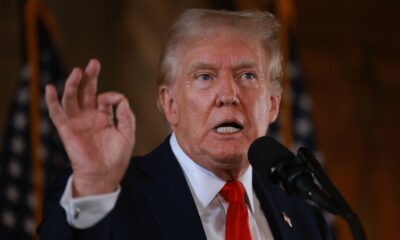SOCIAL
Elon Musk Raises More Questions About Twitter’s Approach, Which Could Lead to a Big Shake-Up

If nothing else, Elon Musk seems determined to shake things up in his time as Twitter’s prime shareholder, and see what he can make happen, which could set the platform on a course for internal angst and user disruption as Twitter’s various chief try to find ways to placate the latest member of their board.
But before we get into Elon’s latest recommendations for the platform, it’s worth establishing where Twitter is at, and what its current goals are, to set a clear understanding of the stakes.
Back in 2020, investment firm Elliott Management purchased a 4% stake in Twitter – worth around $1 billion at the time – with the intent of forcing Twitter to oust long-term CEO Jack Dorsey and replace him with a more business-focused leader, with a view to maximizing the app’s performance.
Elliott’s view was that Dorsey, who is also the CEO of Square, was unable to give the company the attention it requires while operating in both roles, so it bought up shares in order to push him out. Eventually, Twitter’s management negotiated a peace deal of sorts with the Elliott group, which involved Elliott and Silver Lake Partners both gaining a seat each on Twitter’s board, and saw Twitter set ambitious new growth targets, which, presumably, also held significant penalties for Dorsey and Co. if they could not be met.
Those targets were shared publicly in February last year:
- 315 million monetizable daily active users by Q4 2023 (Twitter currently has 217 mDAU and added 18m in total in 2021)
- $7.5 billion annual revenue in 2023 (Twitter made $3.7b in 2020 and $5.1b in 2021)
As you can see, those are some tough targets, and it may be that the pressure placed on the company as a result of Elliott’s push lead to Dorsey’s decision to step down as CEO in November last year. Dorsey was replaced by CTO Parag Argrawal in the role, and that could, in some respects, have given the Elliott consortium what it wants, which could have eased the pressure on the company – but then, shortly after his appointment, Agrawal re-affirmed that Twitter would maintain these growth targets in Dorsey’s wake.
So Twitter already has a tough road ahead of it, especially on user growth. And into this comes Elon Musk, who bought up a 9% stake in Twitter late last week. That’s double the holding of Elliott Management, and more than Elliott and Silver Lake combined, giving Musk a significant voice in the company. Twitter quickly appointed Musk to its board, amid concerns that he could look to buy-up even more shares, and take a controlling interest in the company (Musk’s appointment to the board limits him from buying more than 14.9% of the company).
And now, we’re in this new reality, where Musk’s voice could hold significant sway in the company’s future direction.
And he’s wasted no time in making provocative claims and assertions ahead of his first AMA with Twitter staff next week.
In a late night flurry of tweets on Saturday night, Musk noted that:
- Twitter’s most popular accounts, based on follower numbers, are not very active, which prompted the question – ‘is Twitter dying?’
And no ads. The power of corporations to dictate policy is greatly enhanced if Twitter depends on advertising money to survive.
— Elon Musk (@elonmusk) April 10, 2022
This comes after Musk shared a poll earlier in the week, in which he asked if Twitter users want an edit button, which more than 4.4 million people responded to (74% in favour). Twitter then noted that it is, in fact, working on an edit button, and has been for some time, but Musk’s poll once again underlined the public pressure that he could put on the company, which he can also now use to back-up his views and opinions in Twitter’s board meetings.
Musk’s array of ideas could certainly cause some headaches, and planning restructures within Twitter HQ.
On the first point, that Twitter’s most popular users are not active – Twitter’s already working on this, by adding in new incentives to get people to tweet more often, including Super Follows, tipping, newsletter integration, on-profile product displays and more. Those probably won’t get the Justin Bieber’s of the world to be more active, because they’re won’t necessarily be incentivized by these revenue programs, but they could get more mid-level influencers more active, which could make Twitter feel more ‘alive’ once again.
Maybe. It’s hard to say how effective things like Super Follows will actually be, but there’s not really a good solution to get more high profile users engaging more often. If Musk has any ideas on that, no doubt Twitter’s management will be keen to hear them.
On the second, that Twitter should add an alternative checkmark for paying users, this idea has been floated many times, that Twitter could verify users that prove their identity, not with a blue tick, but with something else, in order to legitimize their presence. Making this a paid option probably isn’t the best way to go (as it could incentivize scammers), but maybe there could be an argument for variable indicators based on proof of identity, which could put more onus on accounts to confirm their details, thereby lessening the impact of fake accounts and bots who wouldn’t have it.
Which leads to Musk’s last point (I can’t say much on the idea that Twitter’s home base should be re-used for another purpose), that there are too many bots and scam profiles in the app, which impacts the user experience. This is likely true – according to previous estimates, around 15% of active Twitter profiles are likely bots, while bot accounts have also contributed up to 60% of the tweets around politically divisive topics at times.
That’s a significant problem – but at the same time, would removing them be in Twitter’s best interests, from a metrics standpoint?
As noted, Twitter’s looking to add almost 100m active users in the next year and a bit. Removing 15% of its active user base – equivalent to around 32m profiles – would clearly impact that strategy, making it virtually impossible to reach.
But maybe it would be better for Twitter, overall, to attack this more vigorously? Maybe it would be better to remove bots entirely, even if it reduces the user count – but then again, we don’t know the penalties that Twitter’s management could be facing if it fails to meet these benchmarks.
Could Musk convince Twitter’s board to change direction on this, if Twitter were to combat bot profiles?
That then leads to questions about identifying and removing bots definitively, which would undoubtedly lead to some false positives, and likely some reduction in engagement, at least in the short term.
Such an approach could work, in the longer-term view, but would Twitter’s other shareholders have the patience required to re-structure this element?
These are the types of questions that Twitter’s going to have to weigh in the Elon Musk era, and while they could well lead to systematic improvements, they could also cause some major headaches for Twitter’s management in the upcoming quarterly reports.
And then there’s the censorship element, and Musk’s potential influence on Twitter’s stance on moderation and removing accounts that break the rules.
Musk recently questioned Twitter’s adherence to ‘free speech principles’ which he noted are fundamental to democracy.
Given that Twitter serves as the de facto public town square, failing to adhere to free speech principles fundamentally undermines democracy.
What should be done? https://t.co/aPS9ycji37
— Elon Musk (@elonmusk) March 26, 2022
Musk was also a vocal critic of Twitter’s banning of former US President Donald Trump early last year.
Given that Twitter serves as the de facto public town square, failing to adhere to free speech principles fundamentally undermines democracy.
What should be done? https://t.co/aPS9ycji37
— Elon Musk (@elonmusk) March 26, 2022
Interestingly, the founder of Elliott Management, billionaire investor Paul Singer, is also a “Republican mega-donor”, who, while he was initially opposed Trump’s policies and approach, eventually came around to backing the former leader.
So now you have at least two elements in Twitter’s board room who, at a glance, would appear to back a more ‘free speech’ approach to moderation at the app.
That could spark big conflicts, especially as social platforms now seem to be generally in agreement that faster action is required on potentially harmful movements, in order to quash them before they gain any traction.
Platforms took too long to address QAnon, allowing it to spread, and infect more people via their networks. They have not made the same mistake on anti-Ukraine propaganda.
Will Musk’s appointment be a step back on this element, and allow more dangerous speech to take hold via tweet?
Certainly, right wingers are happy with Musk’s board ascension, and with the pending failure of Trump’s ‘Truth Social’ app, they’ll be keen to see if Musk can reinstate some of their past freedoms, at least in a perceptual sense, within the app.
No matter what, Twitter certainly looks set for a shake-up – but whether the end result is actually a better experience, we’ll have to wait and see.



















You must be logged in to post a comment Login